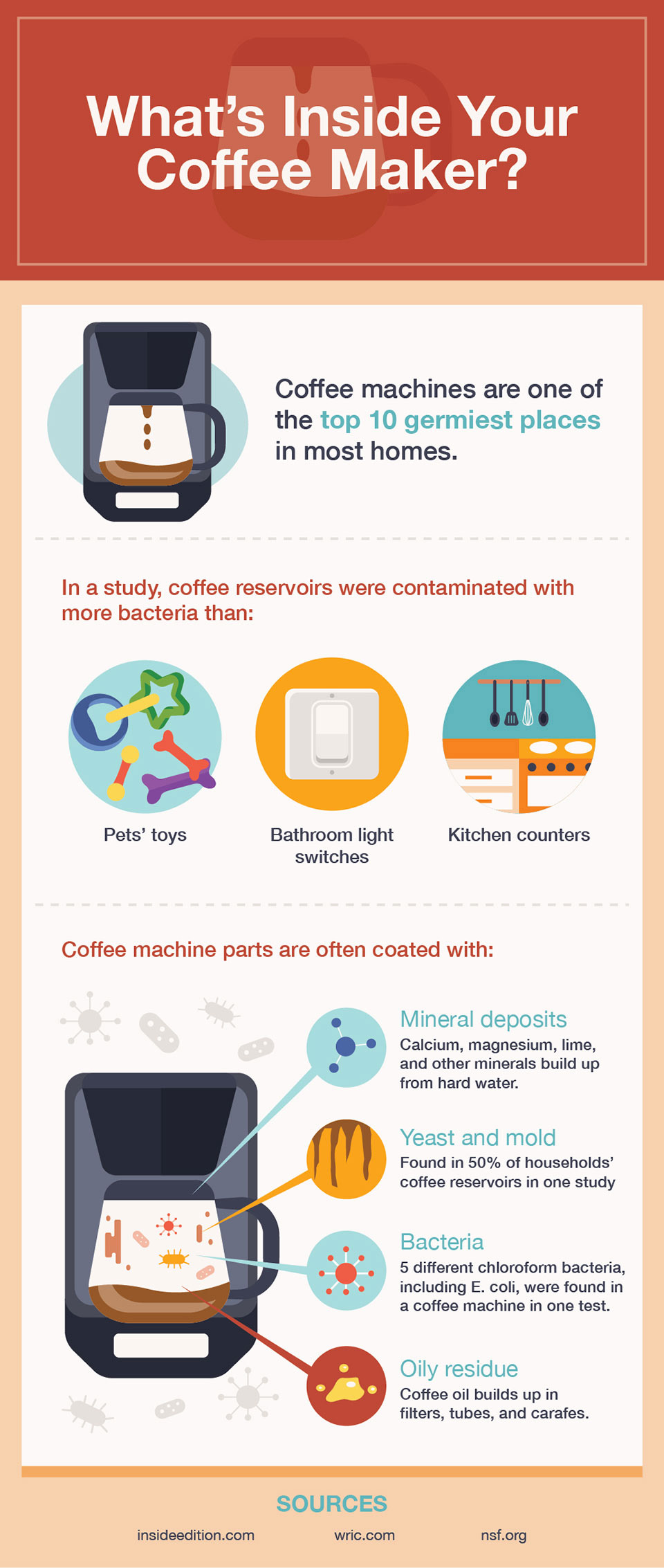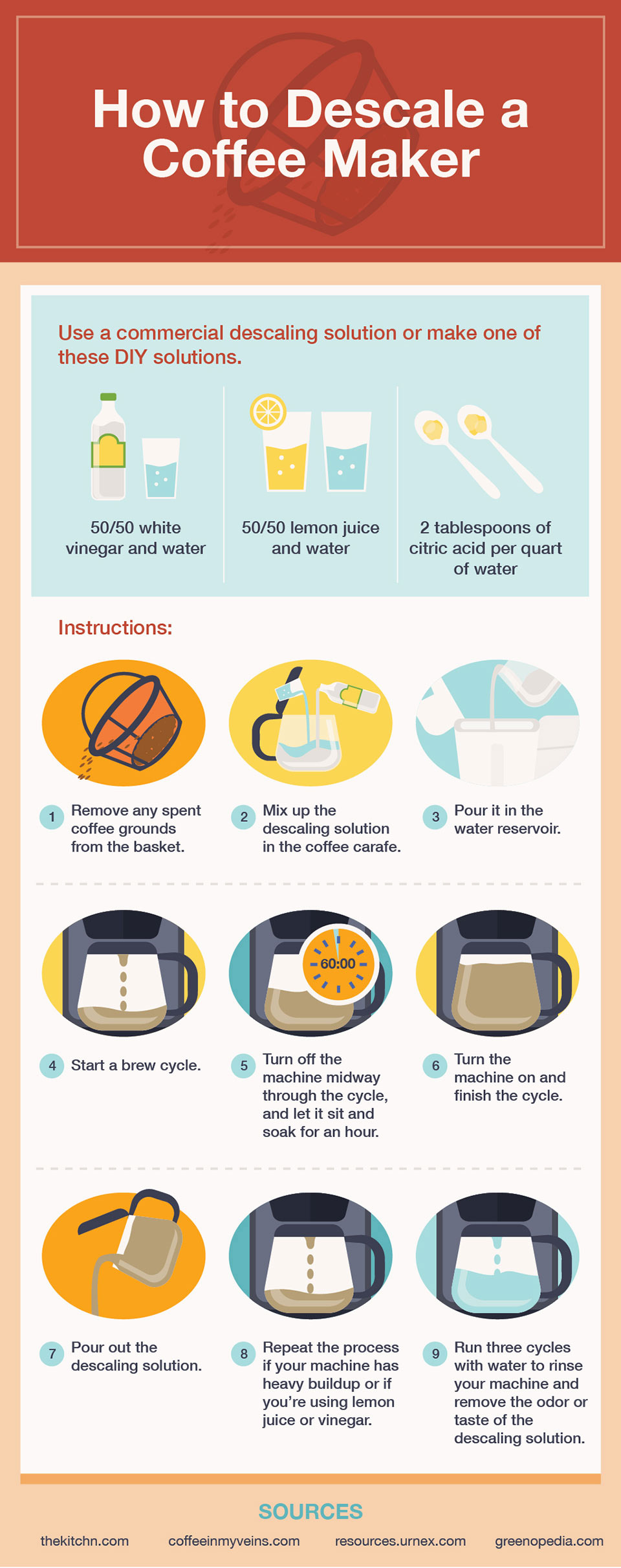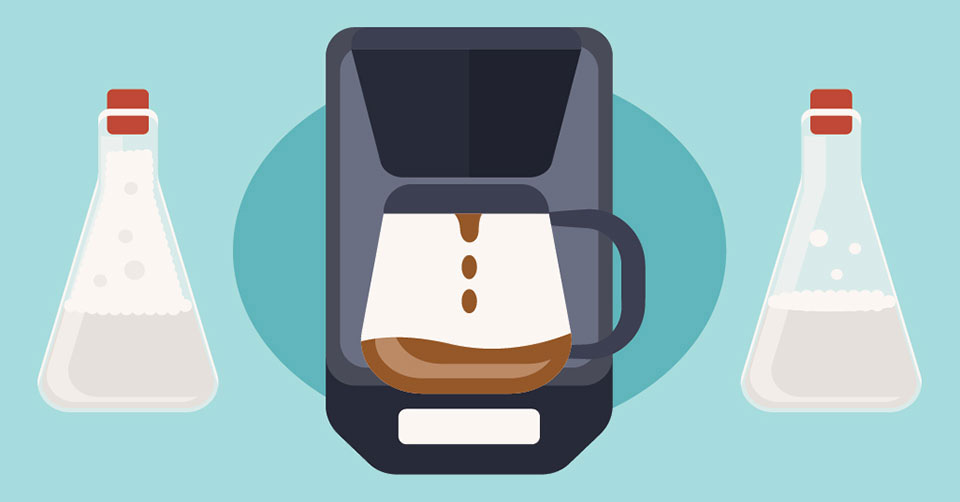If you love a steaming cup of coffee in the morning, you're not alone. Per capita, Americans drink almost 90 gallons of coffee a year. And nothing goes together as well as coffee and the workplace. In fact, 86 percent of full-time workers drink coffee daily. Java's mouthwatering aroma and rich flavor help us get through the morning commute. Once we're at work, coffee can boost alertness and focus and it may even help fuel teamwork, according to a recent study.
It's too bad office coffee has a bad rap. Sometimes, a cheap coffee machine and cheap coffee beans are to blame. Sometimes coffee sits on the burner for too long. But far too often, the culprit is a dirty machine. The good news? There's a solution: regularly clean and descale your coffee maker! Keep reading to discover the difference between cleaning and descaling a coffee maker, and learn how to descale yours.

Cleaning vs. Descaling
All sorts of unwanted impurities can collect in a coffee machine—including coffee oil, bacteria, yeast, and mold—which can make coffee taste bitter or rancid. When you clean your machine, you can effectively remove these impurities. It's a good idea to clean the coffee carafe with soap and water after every use, and deep clean your machine with a cleaning solution roughly once a month.
The purpose of descaling is different. The goal is to remove mineral buildup. A cup of brewed coffee is mostly water, and water contains minerals such as calcium, magnesium, and lime. These minerals can build up inside your carafe, in the tubes, and on the burner.
If you don't remove mineral buildup, your coffee may taste off or bitter. Or your coffee maker may not reach the optimal brewing temperature, which can result in lukewarm or weak coffee. In the worst-case scenario, mineral buildup can clog the water flow and prevent your machine from working at all.
Is Hard Water Ruining Your Coffee?
You're more likely to experience problems with mineral buildup if you have hard water, meaning your water contains high levels of minerals. If you have hard water, you'll probably notice a few other tell-tale signs, including:
- White residue on faucets
- Soap scum on sinks
- Spots on clean dishes
- Clogged pipes
- Low water pressure
- Skin irritation
You can do a simple DIY test to figure out whether you have hard water. All you need is pure castile soap and a jar with a lid. Fill the jar a third of the way with tap water, and add 10 drops of pure castile soap. (Make sure the soap doesn't contain a detergent, which will ruin the test.) Put the lid on the jar, and shake it vigorously for 10 seconds. Now analyze the water.
If you have soft water, the water will have a large number of bubbles on top and be mostly clear underneath. If you have hard water, the water will have few bubbles on top and be cloudy underneath.
If, after doing the test, you suspect you have hard water, there are three ways to find out for sure.
- Call your public utility and ask if they know how hard the water is.
- Buy a water hardness testing kit and test your water yourself. (Testing strips cost between $3 and $20.)
- Hire a professional water softening company to test your water and advise you on softening solutions.

No matter how hard your water is, you should descale your coffee machine at least every three months. But if you have hard water, you need to do it more often. Your machine may have a light indicator that lets you know when it's time to descale. If it doesn't and you know you have hard water, descale your machine about once a month.
Descaling Your Coffee Maker
You can buy a commercial descaling solution to help you descale your machine, which may be the easiest and most effective way to get the job done. Commercial descaling solutions generally contain citric acid and other strong acids. They're the most expensive way to descale a coffee maker, but they tend to work well. If you decide to go this route, look for a natural, non-toxic product, and follow the instructions on the bottle.
As an alternative, you can make your own descaling solution. But first, check your coffee machine's manual to make sure the manufacturer doesn't advise against certain solutions.
These are the three most common ingredients used to descale coffee makers.
- White vinegar
Vinegar is easy to find, and it's acidic enough to dissolve mineral buildup. Many people use it to clean their coffee makers, and some coffee machine manufacturers recommend it as an option. But it may not be as effective as a commercial descaling solution, so you may need to repeat the process a couple times. To make a descaling solution with vinegar, fill your coffee carafe with equal parts vinegar and water.
- Lemon juice
Lemon juice is commonly used to descale machines. It's not nearly as acidic as commercial descaling solutions so you may need to repeat the descaling process several times. But on the upside, it smells good! To make a descaling solution out of lemon juice, fill your coffee carafe with equal parts lemon juice and water.
- Powdered citric acid
Citric acid is the most effective of the homemade solutions. It's an acid that's found most abundantly in lemons, limes, oranges, and other citrus fruits. It was first isolated from lemons in 1784 using a fungus. Today, citric acid is widely used as a preservative in the food industry, but it doesn't come from lemons anymore. It's usually grown on a black mold that converts cornstarch sugars into citric acid.
You can buy a bag of powdered citric acid online, at many health-food stores, and at some grocery stores. To descale your coffee maker with citric acid, aim for a 20 percent acid solution. Usually, this means you'll add 2 tablespoons of powder per quart of water.
Once you buy or make a solution, it's time to descale your machine. Check your user's manual to see if your coffee maker has a special descaling cycle. If so, follow the instructions in the manual. If not, follow these instructions to descale your coffee maker.
- Remove any spent coffee grounds from the basket.
- Mix the descaling solution in the coffee carafe
- Pour the solution in the water reservoir as if you're making coffee.
- Pour the solution in the water reservoir as if you're making coffee.
- Start a brew cycle.
- Turn off the machine midway through the cycle, and let it sit and soak for an hour.
- Turn the machine back on and finish the brew cycle.
- Pour out the descaling solution.
- If your machine has heavy scaling or if you're using lemon juice or vinegar, repeat the process one more time.
- Run three cycles with only water to rinse your machine and remove the odor or taste of the descaling solution.

Conclusion
By regularly cleaning and descaling your coffee machine, you can improve the coffee at home and the office. And for that, your family and colleagues will celebrate.
Share this infographic on your site
Abby Quillen
Abby Quillen writes about sustainability, green living, health, business, and other topics. Her work has appeared in The Christian Science Monitor, YES! Magazine, and dozens of other publications. She lives in Eugene, Oregon with her family. Visit her at abbyquillen.com.


